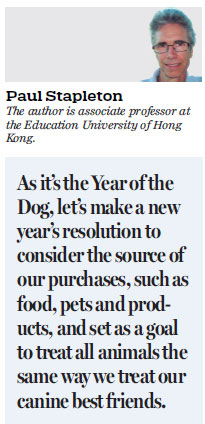All creatures deserve benign treatment
Updated: 2018-02-26 06:37
By Paul Stapleton(HK Edition)
|
|||||||||
The police force's discovery of about 400 endangered wild animals in a New Territories apartment is just one sad incident in a long line of unfortunate stories of animal mistreatment in our city. In this case, police found snakes, fish, a leopard cat and a rare giant salamander among other animals. Two men were arrested on suspicion of possessing endangered and protected species and breaching the Public Health and Municipal Services Ordinance. The animals appeared to be in reasonable health, suggesting the men may have been illegally trading in endangered species.
The animals are now in a facility but it is not as if they can easily be released into the wild. After being in captivity, animals usually adjust poorly and often quickly die or are killed when they are freed. After all, Hong Kong's country parks and waters are not necessarily an appropriate habitat for them.

This whole animal-treatment issue brings up another recent news story: the hit-and-run killing of four young wild boars on Route Twisk. A fifth boar that was injured in the accident was later put down but not before officers and veterinarians did their best to save it. Hong Kong having a dedicated team of officers and veterinarians equipped with tranquilizer guns to deal with wild pigs in urban areas speaks to the lengths our government will go both to protect the public and the wild pigs. However, this careful concern for our porcine wildlife presents a striking contrast to treatment of their domestic cousins that appear frequently on our plates.
Over the past few years, nearly 2 million pigs have been slaughtered each year to be consumed by our population of 7 million. In effect, this means the average person in Hong Kong eats the equivalent of a whole pig every three or four years, a striking contrast to the excessive care we show for boars injured in the city.
Indeed, we Homo sapiens are omnivores. Many parts of our body indicate we are meat eaters. We have canine teeth like other predators, although they have evolved to be not so sharp over the eons. The binocular vision of our eyes is also the same as that of all predators. And our taste buds have evolved to enjoy eating meat. All of this, coupled with the fact that pigs happen to be tasty, suggests there is little wrong with enjoying pork and bacon. However, when we compare the lives of the wild boars caught in the city and then released into the wild, with the lives of the pigs that end up inside our cha siu bao, the difference is stark.
Local wild boars eat, sleep and mate to their heart's content in our countryside, living a mostly healthy existence until they die a natural death after up to 10 to 15 years in the wild, provided they stay clear of our urban jungle. Compare that to the domestic pigs that arrive on our plates as suckling pig. Ironically, it is the baby pigs that are the lucky ones because they are slaughtered after about a month. The unlucky full-grown ones last six months before they are slaughtered but that existence is singularly miserable.
The one thing pigs need more than just about anything is soil to forage around in for their natural food. However, most domestic pigs are kept jammed into concrete pens for their entire lives. In such close quarters without soil to dig in, they become stressed out and aggressive toward each other. Pigs' tails are often cut off so they are not chewed off by their caged brethren. Unlike tranquilizers used on local wild boars, domestic pigs don't have painkillers. Mercifully, at the half-year mark, they are sent to the slaughterhouse.
While we are on the subject of our treatment of animals, all of the attention has gone to another animal that somehow remains privileged above all the others. I speak of man's best friend: the dog, and its role in ringing in the Lunar New Year. Some of us are troubled by our ambivalent relationship with this animal, whose faithfulness stands out among all creatures, when reports about eating dog meat appear in the media. Both dog lovers and some members of the public are usually outraged. Yet, although many people have severe qualms about eating dogs, pigs - who also hold one of the dozen places in the Chinese zodiac - get no free pass at our dinner tables.
Thus when it comes to our treatment of animals we appear to have a mixed but mostly poor record in caring for them, especially those destined for our dinner tables. So as it's the Year of the Dog, let's make a new year's resolution to consider the source of our purchases, such as food, pets and products, and set as a goal to treat all animals the same way we treat our canine best friends. A remark by the great English naturalist Charles Darwin comes to mind: "The love for all living creatures is the most noble attribute of man."
(HK Edition 02/26/2018 page8)